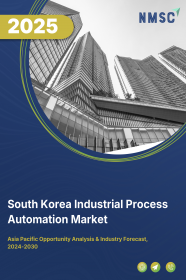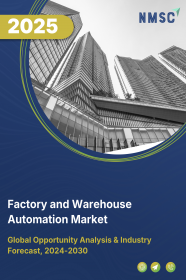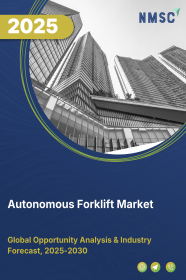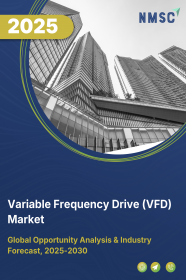
South Korea Industrial Process Automation Market by Component {MES (Hardware, Software, Services); DCS (Hardware, Software, Services); PLC (Hardware, Software, Services); SCADA (Hardware, Software, Services); Field Instruments; Industrial Robots; Human Machine Interface; Industrial PCs; Process Analyzers & Drives} and by End User (Oil & Gas, Chemicals & Refining, Energy & Power, Pulp & Paper, Metals & Mining, Pharma, & Others) – Global Opportunity Analysis and Industry Forecast, 2025–2030
Industry: Semiconductor & Electronics | Publish Date: 31-Oct-2025 | No of Pages: 159 | No. of Tables: 121 | No. of Figures: 66 | Format: PDF | Report Code : SE1002
Industry Outlook
The South Korea Industrial Process Automation Market size was valued at USD 1.12 billion in 2024 and is projected to grow to USD 1.24 billion by 2025. Additionally, the industry is expected to continue its growth trajectory, reaching USD 1.80 billion by 2030, at a CAGR of 8.14% from 2025 to 2030.
The rising deployment of robots in South Korea’s manufacturing sector is a key driver of market growth, as robotics enhance precision, streamline workflows, minimize human error, and accelerate production cycles, making them central to large-scale industrial automation adoption.
Government-backed investment in research and development (R&D) further strengthens this momentum by supporting innovation in robotics, AI, and smart factory solutions, enabling industries to improve productivity, reduce costs, and enhance global competitiveness.
However, security and data privacy concerns act as a restraint, as greater digital connectivity exposes automation systems to cyber risks, creating hesitancy among businesses. At the same time, the integration of artificial intelligence (AI) and machine learning (ML) offers a strong growth opportunity, enabling predictive maintenance, real-time decision-making, and intelligent quality control that optimize efficiency, enhance flexibility, and reinforce South Korea’s position as a leader in smart manufacturing.
Rising Deployment of Robots in Manufacturing Boosts Market Expansion
The implementation of robots in South Korea’s manufacturing sector is significantly fueling the South Korea industrial process automation market demand by enhancing operational efficiency, minimizing human error, and accelerating the adoption of automation technologies across industries. Robots enable higher precision, faster production cycles, and greater overall output, helping companies remain globally competitive.
According to the 2024 report by the International Federation of Robotics (IFR), South Korea recorded the world’s highest robot density, reaching 1,012 units per 10,000 employees in 2023. This remarkable density highlights the nation’s reliance on robotics to streamline production processes, optimize efficiency, and drive large-scale industrial automation adoption.
Government Investment in R&D Strengthens Automation Adoption
Government-backed investment in research and development (R&D) is another key factor driving the industrial process automation market in South Korea. By funding projects in robotics, AI, and smart factory solutions, the government fosters innovation and accelerates the rollout of cutting-edge automation technologies. These initiatives help industries reduce operational costs, improve productivity, and enhance global competitiveness. This proactive support underscores South Korea’s vision to position itself as a global leader in advanced manufacturing and industrial innovation.
Security and Data Privacy Concerns Limit Adoption
Despite strong momentum, cybersecurity risks and data privacy concerns hinder the widespread adoption of industrial automation in South Korea. As companies connect automation systems to digital networks, they become increasingly vulnerable to cyberattacks and unauthorized access to sensitive operational data. These risks create hesitation among businesses, slowing investment in digital automation technologies and creating an additional barrier to full-scale adoption.
Integration of AI and Machine Learning Enhances Process Efficiency
The growing integration of artificial intelligence (AI) and machine learning (ML) presents a major opportunity for the South Korean industrial process automation market. These technologies enable predictive maintenance, intelligent quality control, and real-time decision-making, reducing downtime and optimizing resource use. By applying AI and ML, industries such as automotive, electronics, and heavy manufacturing enhance operational efficiency, achieve greater flexibility, and strengthen resilience against disruptions, reinforcing South Korea’s status as a global hub for advanced smart manufacturing.
Competitive Landscape
The promising players operating in the South Korea industrial process automation industry are Siemens AG (Siemens Korea), ABB Ltd (ABB Korea), Schneider Electric SE (Schneider Electric Korea), Honeywell International Inc. (Honeywell Korea), Emerson Electric Co. (Emerson Korea), Rockwell Automation, Inc. (Rockwell Korea), Yokogawa Electric Corp. (Yokogawa Korea), Mitsubishi Electric Corp. (Mitsubishi Electric Automation Korea), Omron Corp. (Omron Korea), Fanuc Corp. (Korea Fanuc Corp.), Yaskawa Electric Corp. (Yaskawa Korea), LS Electric Co., Ltd., Bosch Rexroth AG (Bosch Rexroth Korea), Beckhoff Automation GmbH (Beckhoff Korea), and Delta Electronics Inc. (Delta Korea).
South Korea Industrial Process Automation Market Key Segments
By Component
-
Manufacturing Execution Systems (MES)
-
Hardware
-
Software
-
Services
-
-
Distributed Control Systems (DCS)
-
Hardware
-
Software
-
Services
-
-
Programmable Logic Control (PLC)
-
Hardware
-
Software
-
Services
-
-
Supervisory Control and Data Acquisition (SCADA)
-
Hardware
-
Software
-
Services
-
-
Field Instruments
-
Industrial Robots
-
Human Machine Interface (HMI)
-
Industrial PCs
-
Process Analyzers and Drives
By End User
-
Oil and Gas
-
Chemicals and Refining
-
Energy and Power
-
Pulp and Paper
-
Metals and Mining
-
Pharmaceuticals
-
Cement & Glass
-
Others
Key Players
-
Siemens AG (Siemens Korea)
-
ABB Ltd (ABB Korea)
-
Schneider Electric SE (Schneider Electric Korea)
-
Honeywell International Inc. (Honeywell Korea)
-
Emerson Electric Co.(Emerson Korea)
-
Rockwell Automation, Inc. (Rockwell Korea)
-
Yokogawa Electric Corp. (Yokogawa Korea)
-
Mitsubishi Electric Corp. (Mitsubishi Electric Automation Korea)
-
Omron Corp. (Omron Korea)
-
Fanuc Corp. (Korea Fanuc Corp.)
-
Yaskawa Electric Corp. (Yaskawa Korea)
-
LS Electric Co., Ltd.
-
Bosch Rexroth AG (Bosch Rexroth Korea)
-
Beckhoff Automation GmbH (Beckhoff Korea)
-
Delta Electronics Inc. (Delta Korea)
Report Scope and Segmentation
|
Parameters |
Details |
|
Market Size Value in 2025 |
USD 1.24 billion |
|
Revenue Forecast in 2030 |
USD 1.80 billion |
|
Value Growth Rate |
CAGR of 8.14% from 2025 to 2030 |
|
Analysis Period |
2024–2030 |
|
Base Year Considered |
2024 |
|
Forecast Period |
2025–2030 |
|
Market Size Estimation |
Billion (USD) |
|
Growth Factors |
|
|
Companies Profiled |
10 |
|
Market Share |
Available for 10 companies |
|
Customization Scope |
Free customization (equivalent to up to 80 working hours of analysts) after purchase. Addition or alteration to country, regional, and segment scope. |
|
Pricing and Purchase Options |
Avail customized purchase options to meet your exact research needs. |

















 Speak to Our Analyst
Speak to Our Analyst
























